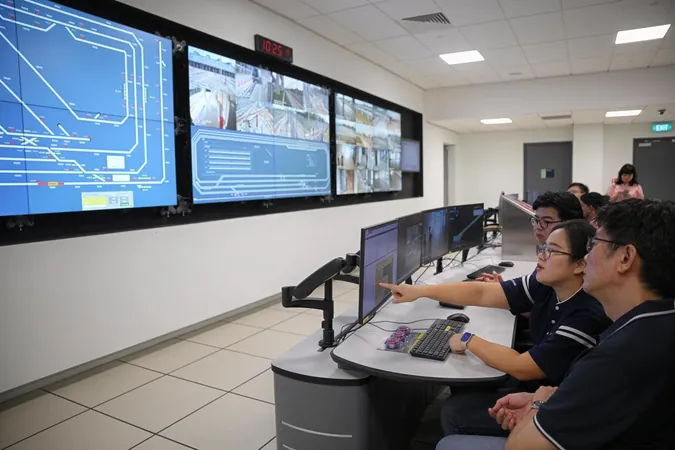
Groundbreaking $800 Million Rail Test Centre Unveils New Era of Train Testing in Singapore
2025-03-29
Author: Sarah
**SINGAPORE** – A state-of-the-art rail testing facility officially opened its doors in Tuas on March 28, marking a significant milestone for Singapore's transport infrastructure. The $800 million Singapore Rail Test Centre (SRTC) aims to revolutionize the way trains and rail systems are tested, bringing these essential operations closer to home and reducing dependency on foreign facilities.
With the completion of its second and final phase, this advanced centre has added two critical test tracks to its repertoire. The first is a 2.8 km performance and integration test track featuring an S-shaped design, enabling granular assessments of how well trains integrate with various rail systems, including crucial signalling and communication technologies. This configuration allows engineers to examine a train's response during turns, a vital aspect when assessing overall performance.
Complementing this is a 3 km endurance test track, which boasts a 500 m incline set at a 3% gradient. This track is designed to simulate real-world conditions, putting potential train models through their paces. Trains must endure roughly 1,000 km of testing on this track, ensuring reliability before they commence service.
Looking ahead, the centre is strategically positioned to enhance Singapore's rail network further. By 2029, a viaduct link will connect the East-West Line’s Tuas West Extension directly to SRTC, allowing seamless access for testing. Until then, trains will be transported to the facility by trailers, ensuring they can take full advantage of the state-of-the-art testing capabilities.
SRTC isn’t just about tracks; it includes a comprehensive three-storey building comprising an operations control centre, maintenance workshops, and dedicated areas for inspection and midlife upgrades of trains. The facility is engineered to relieve the pressure on existing rail networks by allowing rigorous testing without disrupting regular services.
In a remarkable show of innovation, SRTC also flaunts a 2.8 km high-speed test track where trains can be assessed at speeds upwards of 100 km/h. This track is equipped with multiple power supply systems to facilitate the testing of different types of MRT trains. Given that systems like the North East Line and the upcoming Cross Island Line utilize overhead conductor rails, and other lines are powered by a third rail, this feature is pivotal for comprehensive testing.
Currently, the SRTC is set to commence testing on 23 new trains designated for the upcoming Stage 6 of the Circle Line (CCL), anticipated to begin operation in the first half of 2026. The new trains have already undergone preliminary assessments at the centre since November 2023, contributing to around 3,000 hours of rigorous testing on the high-speed track thus far.
As the CCL expands, Stage 6 will complete the line, seamlessly connecting HarbourFront and Marina Bay stations, enhancing commuter options and transit efficiency across the region.
Senior Minister of State for Transport, Amy Khor, emphasized the importance of the centre during its grand opening, highlighting the relief it brings by minimizing reliance on overseas testing facilities that often do not mirror Singapore's unique operating conditions, particularly its weather.
The establishment of SRTC signals a broader ambition to bolster Singapore's rail expertise, offering practical training for local rail engineers and facilitating research and development opportunities. It is poised to position Singapore as a regional hub for rail testing, fostering collaboration and elevating standards across the industry.
Originally proposed in 2019, SRTC's creation reflects a commitment to enhancing the reliability and efficiency of Singapore's expanding rail network while also making operations smoother for ongoing maintenance. Ultimately, this ambitious project not only promises improved service for the public but also heralds a new era of innovation and capability in Singapore's rail sector.




 Brasil (PT)
Brasil (PT)
 Canada (EN)
Canada (EN)
 Chile (ES)
Chile (ES)
 Česko (CS)
Česko (CS)
 대한민국 (KO)
대한민국 (KO)
 España (ES)
España (ES)
 France (FR)
France (FR)
 Hong Kong (EN)
Hong Kong (EN)
 Italia (IT)
Italia (IT)
 日本 (JA)
日本 (JA)
 Magyarország (HU)
Magyarország (HU)
 Norge (NO)
Norge (NO)
 Polska (PL)
Polska (PL)
 Schweiz (DE)
Schweiz (DE)
 Singapore (EN)
Singapore (EN)
 Sverige (SV)
Sverige (SV)
 Suomi (FI)
Suomi (FI)
 Türkiye (TR)
Türkiye (TR)
 الإمارات العربية المتحدة (AR)
الإمارات العربية المتحدة (AR)